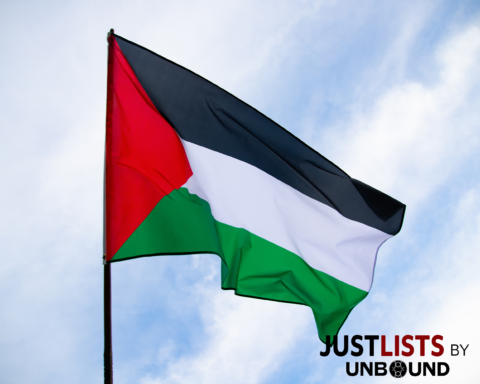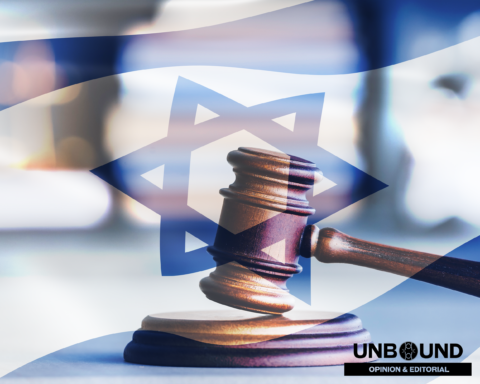On Divestment at the Presbyterian Church (U.S.A.) 220th General Assembly
By Rifat Odeh Kassis Unbound welcomes this voice from Kairos Palestine as a means for widening and deepening the conversation around the appropriate measures to bring about peace and justice in Israel and Palestine. Unbound also welcomes further discussion of divestment and other forms of engagement. View and Print as PDF.
View and Print as PDF.

People’s interpretations vary enormously in response to the recent decision made by the Presbyterian Church (U.S.A.), during its General Assembly in Pittsburgh, not to divest from specific companies profiting from the illegal Israeli occupation. Some view the vote as a defeat for the pro-justice camp within the church. Others view it as a win-win for both parties: the vote was 333 to 331, after all, with such a thin margin that both sides could claim victory.
This vote divides the PC(USA) into two essentially proportionate camps. While they have been in agreement on many important issues—such as, most recently, boycotting Israeli products coming from illegal settlements—the divestment vote still splits them on their definition of justice in Palestine and Israel.
For my part, I believe that the primary winner in the General Assembly was justice itself.
No one would argue about the importance of church unity. All churches and their respective international and regional ecumenical bodies place church unity high on their agendas. They all follow Scripture in saying, “Make my joy complete by being of the same mind, maintaining the same love, united in spirit, intent on one purpose” (Philippians 2:2). And just as I pray for church unity in general, I also pray for unity within the PC(USA).
I believe that both sides, both parties that emerged divided on the issue of divestment, act in good faith and are driven by good intentions in working for peace with justice in Palestine and Israel. The problem, as I see it, however, is the fact that they differ in the depth of their understanding of the situation on the ground. They also differ in their ability to withstand the tremendous intimidation and numerous threats posed to them by Zionist (Christian and Jewish) lobbies and right-wing Christians. They differ, finally, in their proposals for peace in our region.
___________________________________________
For my part, I believe that the primary winner in the General Assembly was justice itself… Palestinians emerged as winners, too. They gained strong friends and supporters among the 331; they also gained an audience with the 333, who likewise grew in their understanding of the underlying problems and of the Palestinian narrative.
___________________________________________
The “minority” camp, responsible for the divestment motion, generated a clear proposal based on the fact that the conflict’s two sides are not equal. Israel is the powerful party and systematically imposes its will on the weaker party. The minority group also knows that time is running out for peaceful solutions and that the war drums are already resounding louder than their own voice. In 1991, when the “peace process” began, there were around 70,000 Jewish settlers in the West Bank, many of whom expressed willingness to move back to Israel if peace prevailed. Today, about 600,000 settlers live in the same area, and they are more radical, more aggressive; they are running not only the settler movement, but also the state of Israel as a whole (despite its coalition government).
Conditions for peace, then, are worsening, and the clock is ticking. I sense that the minority camp within PC(USA) understands this, and knows from both sides of the conflict that there is no time left. Palestinians tell them that there’s no more land for their children to build houses on and cultivate their crops; they fear that, if the settlements and the wall continue to uproot their olive trees, there will be none left even to offer branches to the Israelis when peace comes.
But it is not only Palestinians calling for an end to the occupation. Ethically conscious Israelis tell divestment-supporters that the occupation has brought corruption: their society is moving rapidly to the ultra-right, and the distinction between left and right is blurring. Many Israelis state that they are growing poorer, with the government’s repeated insistence on building settlements in the West Bank including East Jerusalem while ignoring problems of housing and unemployment in Tel Aviv and other cities. These conscious Israelis report that they are ashamed of how their government and society deal with the Palestinians and how they deal even with non-political issues like African migration to Israel, beginning to deny migrants admittance even to hospitals. These Israelis tell occupation opponents that not only diplomatic peace is at stake, but also their own values, their principles, their belief in human rights and democracy.
The PC(USA) minority party built their proposal on harsh, urgent realities such as these—and on ethics and international legitimacy, including international laws and UN resolutions. They understand that some economic pressure on Israel and its supporters is necessary if peace is to prevail.
___________________________________________
The anti-divestment bloc says that if we get “engaged” and invest in the Occupied Palestinian Territories (OPT), things will get better. In my mind, this argument is tantamount to making the Palestinians’ cage prettier and more comfortable to live in; it misses the point that people should never live in cages and that all cages are ugly.
___________________________________________
In contrast, the “majority” party did not have a clear proposal. They root their arguments in vague proclamations like “Both parties are equally responsible for the deterioration of the situation” and “Both parties need to sit down together and talk until a peaceful settlement is reached.” As Israeli peace activist Uri Avnery once said, they want the mouse to sit beside the cat and discuss what they’re having for dinner. They ask why Israel is being “singled out” for criticism when many Middle Eastern countries abuse human rights on a regular basis. They express their concern about relationships with Jewish communities in the U.S. and elsewhere, fearing that these relationships will be damaged if the PC(USA) were to take any measures without their approval. They focus their concern, moreover, on those Jewish communities linked to Israeli lobbies rather than listening to the other Jewish voices: the voices that say, both from within Israel and abroad, that Israel must be pressured to lift its oppression of the Palestinian people and respect its obligations under international law.
The majority party fails to address Palestinians with respect to what they should do and how long they should wait until Israel turns to them and agrees to the concept of “live and let live.” They fail to see that the two-state solution—widely accepted by all countries, including the U.S.—is vanishing as a viable possibility, as soon there will no longer be any land for the Palestinians to build anything, even tents, for their children. They fail to communicate exactly what they mean by “singling out” Israel: that Israel does abuse human rights, but that they reject focusing exclusively on its violations? That because most countries in the region are human rights abusers, Israel should not be criticized? They also fail to tell us how “positive investment” is actually going to bring about peace in the region.
This last omission is of utmost importance. The anti-divestment bloc says that if we get “engaged” and invest in the Occupied Palestinian Territories (OPT), things will get better. In my mind, this argument is tantamount to making the Palestinians’ cage prettier and more comfortable to live in; it misses the point that people should never live in cages and that all cages are ugly. With this argument, they also fail to understand that any and all investments in the OPT only help Israel as the dominant economic power: it passively endorses and concretely perpetuates the existence of the occupation, making it cheaper and even profitable for their society.
Maybe the anti-divestment vote will help sustain the PC(USA)’s relationship with one sector of the Jewish community: the one associated with Zionist lobbies, the one that wants to keep the occupation alive. But it certainly will not satisfy the demands of another voice in the same community: the one speaking up to end the occupation. And it will not help any of us in Palestine and Israel—neither occupiers nor occupied—to achieve a just and lasting peace.
___________________________________________
Most of all, Presbyterians have given the universal church another model to follow:
justice comes before unity.
___________________________________________
I do want to say that, regardless of both parties’ arguments, the Presbyterians showed tremendous courage in their Assembly, knowing that this subject could and would divide them. They showed great responsibility and commitment toward the call for world peace regardless of the prices to be paid. They also gave other churches a model to follow: a model assuring them that divisions based on matters of justice are justified and important. In other words, justice is an issue that merits our divisions: “For there must also be factions among you, in order that those who are approved may have become evident among you” (1 Corinthians 11:19).
Most of all, Presbyterians have given the universal church another model to follow: justice comes before unity. In doing so, they have gained the respect of all those who followed their Assembly and its proceedings—the Palestinians first among them. Indeed, “What does the Lord require of you but to do justice, love kindness, and walk humbly with your God” (Micah 6:8).
In this spirit, I wrote earlier that justice was the primary winner in the PC(USA) General Assembly. But I believe that the Palestinians emerged as winners, too. They gained strong friends and supporters among the 331; they also gained an audience with the 333, who likewise grew in their understanding of the underlying problems and of the Palestinian narrative. Their vote for a complete boycott of Israeli settlement products shows that their support for Israel and its occupation is conditioned; it is neither blind nor absolute.
Now, the majority party may expect enormous changes in Israeli practices in the OPT. I would like to extend an invitation to this party to come and visit us in Palestine, where they will be met with warm hospitality and our commitment to show them the pure reality on the ground. I have no doubt that, with their strong commitment to justice, they will see and be transformed.
Finally, I pray for both camps within the PC(USA). I pray for the 331 members: I pray for God to give them the strength to keep up their struggle for their faith and their values, the strength to keep walking with God. I also pray for the 333 members: I pray for God to open their eyes so that they can see what they have failed to see thus far, and I pray that they will have more desire to come and see the truth as it exists. And to see both of us, Israelis and Palestinians, in our respective contexts and realities. I pray, too, that God will give them the wisdom to come up with a clear, bold, peaceful proposal that might help us avoid falling once again into war and bloodshed.
I pray that God will give us all the courage to see the truth and act accordingly.
See more articles like this one from the Oct 2012 issue, “The Backstory of General Assembly”
_____________________________
Author Bio: In 1991, Rifat Odeh Kassis, a Palestinian Christian, founded the Palestinian section of the Geneva-based global child rights’ movement, Defence for Children International (DCI), and has been its general director since 2008. From 2005 till 2012, he was the elected President of the movement at the global level. In January 2005, he worked in Geneva as the International Coordinator and Project Manager of the World Council of Churches (WCC) Ecumenical Accompaniment Program in Palestine and Israel (EAPPI) and in 2007 till 2008 he became the special advisor for the WCC General Secretary on the Middle East. He was the driving force and one of the co-authors of Kairos Palestine document and became the General Coordinator of Kairos Palestine Group since its inception. In 2006 he published his first book with the title “Palestine, A Bleeding Wound in the World’s Conscience” and in 2008 he co-published a book with the title “Palestinian Christians: Facts, Figures and Trends” and in 2011 he published his third book “Kairos for Palestine”.





Unbound Social